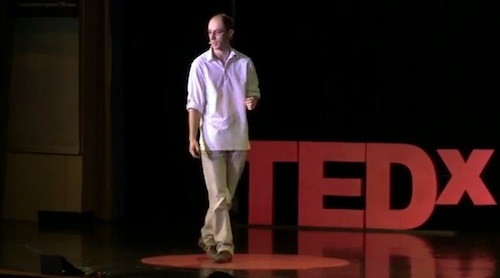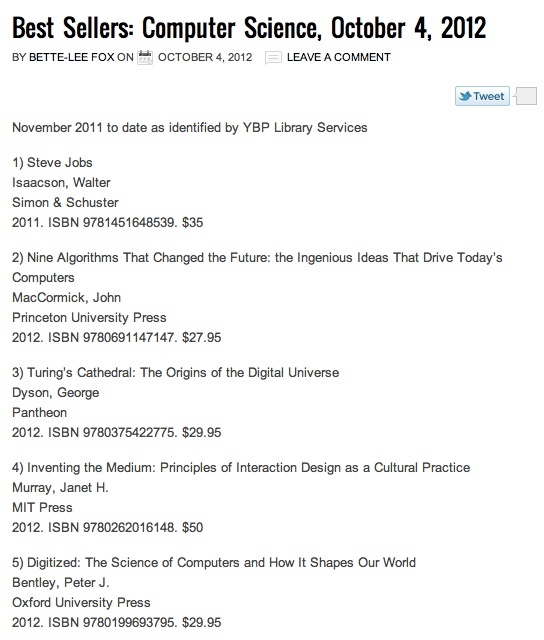| |
|
July 27, 2013 1:26 PM
Posted By Peter Bentley
|
I've been many things in my career to date. A scientist, science writer, author, science
communicator, public speaker, professor. I've also sometimes been a programmer, an app
developer, web designer, photographer, editor, and publisher. I've also been called quite a few
things. A maverick, polymath, and, well a few less kind things too. (Someone even threatened
to punch me at a recent conference because of my charming smile.) But in this recent article for
Discovery News in which I am quoted, I have a new title: Psychologist. Um... really? It's true
I've been working with quite a few of them recently, but this one is really a bit inaccurate!
You can read the article, which is about bad luck,
here
|
|
April 12, 2013 6:24 PM
Posted By Peter Bentley
|
I was commissioned a couple of months ago to write another piece for BBC Focus magazine.
They wanted a speculative article, discussing what the world might be like if the technology
existed to upload our memories into computers. I couldn't resist giving them a short story - not
what they asked for, but they liked it so much that it was published in the April edition of the
magazine. Here's a copy below if you want to read!
![]() 
|
|
February 18, 2013 5:47 PM
Posted By Peter Bentley
|
Below I mentioned that my systemic computer was featured in a New Scientist article. Since
then, the work has been picked up worldwide and has appeared in many surprising places.
Many thanks for the interest! Some of the other articles have included, erm... some interesting
claims. Just to clarify: the systemic computer can repair its damaged code. It is not a PC,
although it has been simulated by a PC and a Mac. It is not a new operating system, it is an
entirely new computer architecture which runs code on bare metal (no operating system). The
FPGA is not a resource manager - we used it to implement the entire computer plus a
conventional co-processor. It does not use Chaos Theory. It does not detect overheating. It
does not run Ms Windows or Max OS X or any operating system. Oh, and it's not Skynet. Not yet
anyway!
Here are just a few of the other articles about the work. I got to page 10 in Google and
gave up. I know there are many, many more out there. Thanks for going to so much trouble,
folks.
Wired.co.uk No more blue screen of death with crash-proof computer
Wall Street Journal tech blog The Self-Repairing
Computer That Never Crashes
Phys.org Researchers build
self-repairing "systemic" computer (Also reported in eScience News, feedstory.net)
ZeeNews Now a Computer that Heals Itself(Also in The Times of
India, truthdive.com, aninews.com, RupeeRains News, penmai.com, socialmediablazer.com)
pcworld.com Crash-proof computer tactic revealed by UK
researchers (also reproduced in computerworld.co.nz)
pcpro.com Crash-proof computer created by London researchers
Hexus.net The "systemic computer" that repairs itself and never
crashes
Slashgear.com Systemic computer can rebuild corrupted
data and never crashes (also reproduced in techinvestornews.com)
digitaltrends.com Scientists design crash-proof computer based on
nature’s chaos
extremetech.com Researchers create crash-
proof, self-repairing, inspired-by-nature computer
kitguru.net How to build a PC that never crashes
venturebeat.com Scientists
invent a self-repairing computer that will never crash (also in ebests.com,
gamespasm.com)
techspot.com Scientists develop computer that never crashes
ubergizmo.com Computer That Never Crashes Mimics Biology
gizmodo.com Scientists Claim They’ve Built a Computer That Never
Crashes
IT News Today Found a way to rid computer of lockups and
crashes
|
|
February 15, 2013 7:08 PM
Posted By Peter Bentley
|
We've been working on my systemic computer for several years but it's only now that we have a working hardware version, thanks to my talented EngD student Christos Sakellariou.
The computer is a result of more than a decade of research into modelling natural processes using conventional computers (processes such as evolution, brains, ecosystems, etc). The models were usually very slow and I realised that our conventional computers have a very different way of processing information compared to all natural systems. For example, our brain has billions of neurons, many of which can fire at the same time. This means information is processed in parallel, distributed across the whole brain. In conventional computers, only one (or very few) instructions are followed at the same time, memory is centralised, and so although they do things very fast, they are still very slow compared to our brains. The other problem is failure - a centralised architecture will fail as soon as one component fails. In our brain we lose neurons every day but we're fine - our brains have the redundancy to cope and the ability to reconfigure themselves to make use of what is left. So I decided I wanted to build a computer that worked more like a brain. The result is the systemic computer. It processes information in parallel and it can reconfigure itself if it gets damaged.
We're still working on it, and you can read more about the systemic computer here. However, we're very pleased to have a lead technology story in New Scientist today! Not only that, but the story was the most read on the New Scientist website . Thanks to Paul Marks for the article.

|
|
December 18, 2012 3:13 PM
Posted By Peter Bentley
|
I was lucky enough to be invited to speak at TEDxBermuda
in October. It was a very interesting experience, with other speakers including John Sculley of Pepsi
and Apple fame. I was the first speaker, and as I joked at the time, if anything was likely to go wrong,
it would happen to me... And of course it did - my videos were accidentally shuffled by the tech
people with the result that most would no longer play. I was forced to improvise - luckily I can be
quite quick on my feet. The bonus was that I've never had so many compliments for a talk
afterwards! The video is now available online (and has been edited to put back the videos that were
missing on the day). Both before and after the event we were treated to nice receptions and dinners
so all in all it was a great time. My thanks again to the organisers for inviting me. You can see the
video here.

|
|
October 5, 2012 7:04 PM
Posted By Peter Bentley
|
My new book Digitized continues to gain nice reviews in the media and I've recently been
informed that we've made a bestseller list in USA, as reported by Library Journal Reviews. We may not
be able to beat the book on Steve Jobs, but I'm happy being at number 5 nevertheless!

|
|
July 9, 2012 3:58 PM
Posted By Peter Bentley
|
On Sunday 3 June I participated in the first TEDxUCL event. There were a range of talks on a
diverse variety of topics. I was allocated one of the longest slots and made use of the time to
talk
about some of the ideas in my research I've been developing for some years. During the first
part
of the talk I also performed a rather physical demonstration of the brittleness of current
technology by hammering a nail through a laptop. The gasps of the audience were quite
amusing.
The
video has
now been made available so you can watch the full talk here. I called it The Sound of
Numbers
Crunching. You can also see a range of
photos
from the event online here.

The twitter response was so funny - particularly when I hammered a nail through a
laptop live
on stage - that I took a few snapshots of it, below:



|
|
June 15, 2012 1:55 AM
Posted By Peter Bentley
|
Material World is a BBC Radio 4 science show hosted by Quentin Cooper that features interviews with
various scientists. This week it was my turn, appearing with the curator of a new turing exhibit in the
Science Museum. We had a ten minute slot (quite a long time in radio land) where we spoke live on
air. You can hear what we had to say by
clicking here.


|
|
April 12, 2012 12:09 AM
Posted By Peter Bentley
|
Another week and another mention in New Scientist. After the review for my latest book
Digitized last week, the work of myself and colleague Soo Ling Lim is featured as lead technology story this
week. Paul Marks wrote a nice story describing our ALife model AppEco. He focusses on our forthcoming paper for
GECCO 2012, where we explore which app developer strategies might be more successful than
others. If you're wondering what the answer is - I'm afraid it depends on what everyone else is
doing at the time... But in general the app store settles down into a stable state all by itself, with
the more dodgy strategies (copying the successful apps of others, or milking a single idea
endlessly) tend to be in the minority compared to more imaginative strategies (optimizing good
ideas or innovating new concepts). So in general we found that it's better to innovate or optimize
than be a milker or a copycat. Which is just as well, because Apple specifically has clauses in the
developer agreement which are designed to discourage milkers and copycats.
It's an interesting piece of work and I enjoyed helping Soo Ling create the model. We're still
working on it, and are looking at the effects of publicity strategies, different charts, and all kinds
of other things...
The article is available online here, or below if you want a quick view.

|
|
April 9, 2012 4:15 PM
Posted By Peter Bentley
|
A month or two ago I was asked to give a list of my favourite books to be featured in the
Expert
Bookshelf in BBC Focus Magazine. It's part of the publicity we're drumming up for my new
book
Digitized. It was a difficult task to choose. I get most pleasure from reading science
fiction, but here I decided to focus (mainly) on non-fiction. Although I'm a computer scientist
my
favourite books are not really just about computers - the books that I think have been most
influential in my research and in my field tend to be those that give us a new perspective on
what
we do. After some thought, I came up with this list:
The Blind Watchmaker - Dawkins inspired a whole generation of computer
scientists and artists with this work, which even included output from a
computer program he had written to evolve forms.
Evolutionary Art and Computers - William Latham and Stephen Todd showed
just
how powerful evolution in computers can be. This book inspired me personally
through my early career.
Sum: Forty Tales from the Afterlives. David Eagleman. A quirky but fascinating
view of life and death, which includes some science fiction and
computer-enabled afterlives.
Cambrian Intelligence: The Early History of the New AI (Bradford Books).
Rodney Brooks helped change the way we approach Artificial Intelligence by
thinking about emergence, bottom up processes instead of engineered, top down
intelligence.
The Unnatural Nature of Science. Lewis Wolpert - Like all his books, this is a
joy to read. It's also a fascinating exploration of what science is and is
not. To a computer scientist this is essential reading, for Lewis explores the
difference between science and technology - a topic often confused in my
field!
In their wisdom, the BBC Focus folks decided to focus on three. They rang me for an
interview
(my words may be online somewhere as a podcast as well). This article was the result:

|
|
|











